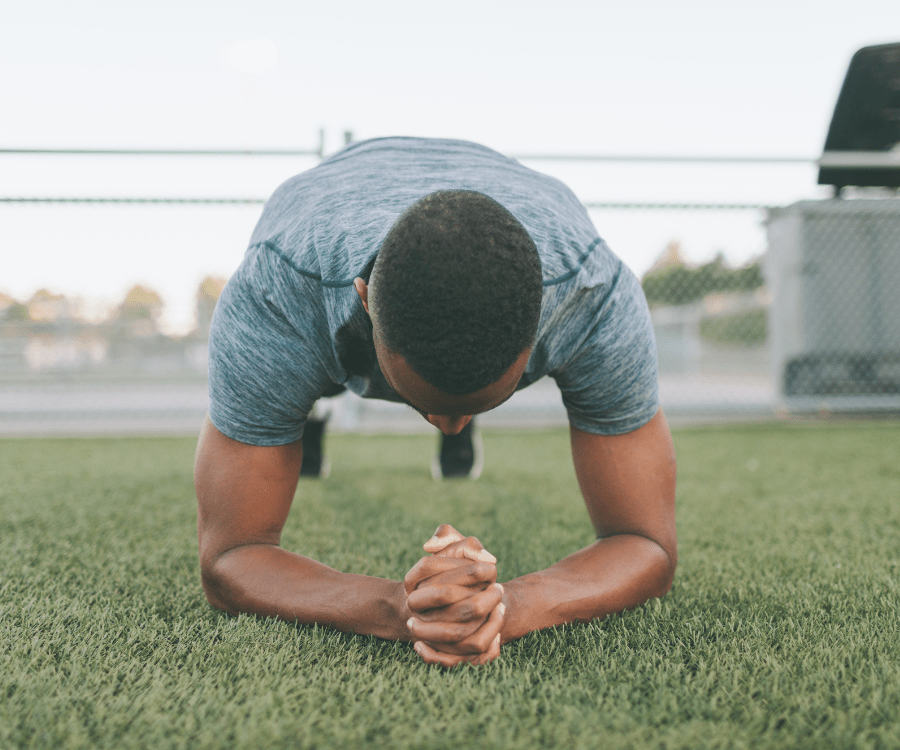Is it normal to shake when doing the plank exercise? What causes the body to shake? We outline the key facts and explain what this means.

Reviewed by Brian Richards, CPT, CSCS. Last updated 16th December.

Key Takeaways
We have all been there before. Just finished a tough workout and decided to work in a few minutes of core exercise before heading home. You get set up in the perfect plank position and 15 seconds later you are shaking from head to toe. What! Why is this? You probably wonder how you just crushed it with the heavy weights and now you can’t even hold your own body weight up. Don’t worry, you are not the only one wondering, “why do I shake when I plank?”
You may shake when you plank for several reasons, but it mostly comes down to fatigue. The plank is an isometric contraction of most major muscle groups, especially your core. These isometric exercises can cause a lot of fatigue, not just of your muscles, but also of your nervous system. Your nervous system has to work hard to coordinate the amount of muscle fibers that contract AND the amount of force your core muscles need to produce during a plank. When this fatigue of your nervous system and your muscular system sets in, your muscles will start to get “mixed messages”, resulting in your core shaking while you are trying to hold a plank.
How long can you hold a plank before you start to shake? Let’s be honest, sometimes it is a little embarrassing when you start to shake when doing a simple plank exercise.
It may very well depend on your fatigue level for that particular day. However, there may be some things you can do to stop this from happening. First let’s understand a little bit more about the plank, muscle fibers, and force production a little bit more in-depth to better understand what the heck is going on.
Muscle fibers and force production during a plank
A plank is performed by an isometric contraction of your core. An isometric contraction is the action of contracting a specific muscle, creating tension and producing force, without actually lengthening or shortening the muscle. You then hold that position for a set duration, usually anywhere between 5 and 30 seconds.
During the plank, and other isometric exercises, your nervous system calls upon your muscular system to activate individual muscle fibers. These muscle fibers have the ability to generate a certain amount of force, depending on their overall strength, endurance, and current level of fatigue.
Ultimately, muscle fibers also have the ability to turn on and off or to change the amount of force it is producing during a plank. This mostly depends on fatigue levels at the level of the muscle fiber or of the nervous system. But it also depends on if the nervous system tells the body it needs more muscle fibers working or not.¹
Think of carrying a heavy, awkward shaped object down the road by yourself. A friend comes along to help you carry it. Then 5 more friends come to help. Ten seconds later 2 friends have to leave. Then 3 more friends come 10 seconds later. The result? An increase and decrease in the overall amount of load you are carrying and when your friends come and go quickly like that, it almost feels like the object is bouncing. Or, in the case of your core, shaking.
To simplify it, there are really 3 reasons why you may shake during a plank:
- Poor synchronization of individual muscle fibers firing together.
- An increasing number of muscle fibers being recruited the longer you hold a plank.
- Decreasing force or muscle fibers turning off due to fatigue.
On top of that, research actually shows that isometric exercises have greater reductions in force output when compared to concentric or eccentric contractions.
So don’t feel bad about it. There are legitimate reasons as to why you shake during planks.
Is it good to shake during the plank?
As you know by now, shaking is essentially a sign of muscular and nervous system fatigue. Shaking during a plank may not actually be a bad thing since the risk of injury is low. Because it is an isometric exercise, you are not moving into any positions that may be compromised due to your level of fatigue.
However, it is easy to lose the strong, neutral core position that is required for an effective plank. If you do start to shake, you will want to make sure you can still hold your whole body, head to foot, in a straight line.
Watch out for:
- Your hips starting to rise.
- Your low back arching.
- Your knees bending.
- Cranking your head and neck up.
- Or any pain or loss of balance.
If you experience any of these, you may as well enjoy a nice rest break. Then reset and get back to it.
A good rule of thumb, if you start to shake, hold it for only a few seconds longer, and then take a break.
What can you do about it?
Our muscles do not operate in a smooth and steady fashion. But there are things we can do to help avoid, or at least decrease, shakes during planks.
- Work on your core exercises, including the plank before your workout.
- Include planks in part of your warm up.
- Consistently work on your planks to help improve the strength, endurance, and coordination of your nervous system and muscular system’s ability to fire up your muscle fibers.
- Perform your core work, including the plank, on days you are not lifting heavy in the gym, or at home.
- Perform an adequate warm up to increase your blood flow, your heart rate, and prime your nervous system for planks and all of your other exercises.⁸ Include;
- A few minutes of a cardio boosting exercise
- Dynamic range of motion
Summary
Don’t become discouraged if you do shake while planking. Remember it is normal and is a sign that you are pushing yourself to the limits. If you weren’t, then you would never progress. But be smart about it and use it as an opportunity to plan for growth in your strength, endurance, and coordination of your core muscles.
